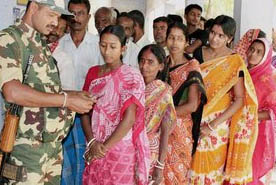 New Delhi, Apr 24: Braving rising temperatures, voters today turned up in good numbers in many of the 117 constituencies in 11 states and Union Territory of Puducherry in the sixth phase of Lok Sabha polls in which stakes are high for the Congress, BJP and number of other parties like AIADMK, DMK, NCP and Shiv Sena.
New Delhi, Apr 24: Braving rising temperatures, voters today turned up in good numbers in many of the 117 constituencies in 11 states and Union Territory of Puducherry in the sixth phase of Lok Sabha polls in which stakes are high for the Congress, BJP and number of other parties like AIADMK, DMK, NCP and Shiv Sena.
An electorate of 18 crore voters will decide the fate of 2076 candidates, including Mulayam Singh Yadav, Sushma Swaraj, Dayanidhi Maran, A Raja, Salman Khurshid and Shahnawaz Hussain.
In all elections to 349 of the 543 Lok Sabha constituencies will be completed in today's exercise in the nine-phased poll. Polling for the remaining 194 seats will be held on April 30 (89 seats), May 7 (64) and May 12 (41). Counting of votes will take place on May 16.
Barring an incident of stone pelting at a booth in Anantnag Parliamentary seat in south Kashmir, which witnessed attack on political workers recently, polling was peaceful in the rest of the constituencies going to poll.
Voters turnout was impressive in Tamil Nadu which witnessed about 40 per cent of the electorate exercising franchise till noon.
Brisk polling was witnessed in various constituencies with Dharmapuri recording 42 per cent followed by Karur 39.6, Thanjavur 39.5 and Dindigul 39.8 per cent.
Chief Minister J Jayalalithaa, MDMK founder Vaiko, Union Minister in the PMO V Narayanasamy seeking re-election in the Union Territory of Puducherry, Tamil actors Rajnikant and Kamal Haasan were among the early voters.
Expelled DMK leader M K Alagiri, Union Finance Finance Minister P Chidambaram, DMK Treasurer M K Stalin, Kanimozhi, former Union Minister Dayanidhi Maran seeking re-election in Chennai Central and N Srinivasan were other promiment personalities who exercised their franchise.
Malfunctioning of EVMs held up voting for a brief spell in Myladuthurai, Krishnagiri and few other places, but electoral authorities fixed the problem and ensured resumption of voting.
Maharashtra witnessed top corporate honchos and Bollywood celebrities making a beeline to cast their vote. An average of 7.83 per cent voting was registered till 9 AM in the state for 19 seats.
In the financial capital Mumbai, captains of industry, including Adi Godrej and Anil Ambani, were among the early birds from India Inc to cast their votes.
Bollywood stars Aamir Khan, Rekha, Vidya Balan, Sunny Deol, Sonam Kapoor added a dash of glamour to the voting process by casting their vote in different voting booths in Mumbai.
In Uttar Pradesh, over 24.63 per cent voters exercised their franchise in the first four hours in 12 seats to decide the fate of 188 candidates.
Over 34 per cent voter turnout was recorded in ten Lok Sabha seats in Madhya Pradesh where voters will decide the fate of 118 candidates including the Leader of Opposition in Lok Sabha Sushma Swaraj, Sumitra Mahajan and Congress leader Meenakshi Natarajan.
In four states of eastern India, a high voter turnout of 28 per cent was recorded in West Bengal while it was a low 13.9 per cent in Jharkhand in the first three hours of polling.
While over 37 per cent voting was recorded till noon during the third and final phase of polling in Assam's six Lok Sabha seats, around 15 per cent polling was recorded in the first three hours in seven Lok Sabha constituencies in Bihar.
There was report of delay in polling in 20 booths in Katihar in Bihar due to problems in EVM machines.
In Rajasthan, an average of 29 per cent voting was registered during the initial hours on the second polling day of Lok Sabha election in five Parliamentary constituencies.
About 20 per cent of electorate cast their votes in the first three hours of polling till 10 AM in seven Lok Sabha constituencies of Chhattisgarh.
After starting out on a dull note, polling started picking up in most parts of Anantnag constituency in Jammu and Kashmir, but remained affected in Pulwama district which recorded a low voter turnout of 2.71 per cent in the first four hours of polling.
Polling had to be briefly stopped at a polling station in Koil in Pulwama this morning after some persons pelted stones on the booth, prompting police to fire warning shots.
No one was injured in the clashes and the polling at the station was resumed a shortwhile later, officials said.
Four districts of south Kashmir, where polling is being held, observed a shut down following a call given by hardline Hurriyat chairman Syed Ali Shah Geelani.





Comments
Add new comment